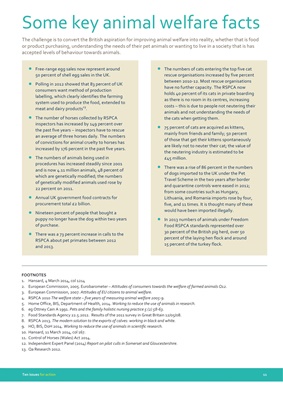
11
Ten issues for action
Some key animal welfare facts
The challenge is to convert the British aspiration for improving animal welfare into reality, whether that is food
or product purchasing, understanding the needs of their pet animals or wanting to live in a society that is has
accepted levels of behaviour towards animals.
Free-range egg sales now represent around
50 percent of shell egg sales in the UK.
Polling in 2012 showed that 83 percent of UK
consumers want method of production
labelling, which clearly identifies the farming
system used to produce the food, extended to
meat and dairy products13
.
The number of horses collected by RSPCA
inspectors has increased by 149 percent over
the past five years - inspectors have to rescue
an average of three horses daily. The numbers
of convictions for animal cruelty to horses has
increased by 176 percent in the past five years.
The numbers of animals being used in
procedures has increased steadily since 2001
and is now 4.11 million animals, 48 percent of
which are genetically modified; the numbers
of genetically modified animals used rose by
22 percent on 2011.
Annual UK government food contracts for
procurement total £2 billion.
Nineteen percent of people that bought a
puppy no longer have the dog within two years
of purchase.
There was a 73 percent increase in calls to the
RSPCA about pet primates between 2012
and 2013.
The numbers of cats entering the top five cat
rescue organisations increased by five percent
between 2010-12. Most rescue organisations
have no further capacity. The RSPCA now
holds 40 percent of its cats in private boarding
as there is no room in its centres, increasing
costs - this is due to people not neutering their
animals and not understanding the needs of
the cats when getting them.
75 percent of cats are acquired as kittens,
mainly from friends and family; 50 percent
of those that get their kittens spontaneously
are likely not to neuter their cat; the value of
the neutering industry is estimated to be
£45 million.
There was a rise of 86 percent in the numbers
of dogs imported to the UK under the Pet
Travel Scheme in the two years after border
and quarantine controls were eased in 2012;
from some countries such as Hungary,
Lithuania, and Romania imports rose by four,
five, and 11 times. It is thought many of these
would have been imported illegally.
In 2013 numbers of animals under Freedom
Food RSPCA standards represented over
30 percent of the British pig herd, over 50
percent of the laying hen flock and around
15 percent of the turkey flock.
FOOTNOTES
1. Hansard, 4 March 2014, col 1214
2. European Commission, 2005. Eurobarometer - Attitudes of consumers towards the welfare of farmed animals Q12.
3. European Commission, 2007. Attitudes of EU citizens to animal welfare.
4. RSPCA 2010 The welfare state - five years of measuring animal welfare 2005-9.
5. Home Office, BIS, Department of Health, 2014. Working to reduce the use of animals in research.
6. eg Ottney Cain A 1991. Pets and the family holistic nursing practice 5 (2) 58-63.
7. Food Standards Agency 22.5.2012. Results of the 2011 survey in Great Britain 12/05/08.
8. RSPCA 2013. The modern solution to the exports of calves: working in black and white.
9. HO, BIS, DoH 2014. Working to reduce the use of animals in scientific research.
10. Hansard, 11 March 2014, col 167.
11. Control of Horses (Wales) Act 2014.
12. Independent Expert Panel (2014) Report on pilot culls in Somerset and Gloucestershire.
13. Qa Research 2012.